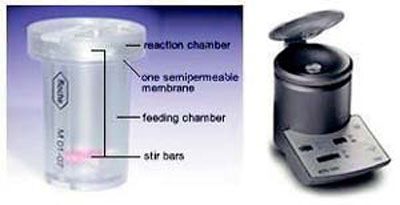| 2004 |

|
YEAR BOOK |
Athlone Institute of Technology
|
Rapid
in vitro
protein synthesis for tissue engineering
|


Actin, in common with many other cytoskeletal proteins, is interesting from a tissue engineering applications perspective, because its assembly and disassembly are relatively easily regulated by manipulation of the external microenvironment.
Protein synthesis or expression initially involves transcribing the gene, encoding the protein of interest, into an RNA intermediate that is subsequently translated to a polypeptide by the highly regulated ribosomal machinery. The RTS 500 system designed for cell free, high-level protein expression (5 mg in 24 hours) combines high yield (HY) E. coli lysate and continuous-exchange cell free (CECF) technologies. Essentially, T7 RNA polymerase catalysed transcription of the gene of interest into an mRNA intermediate, and subsequent translation by the ribosomal machinery provided by HY E. coli cell lysates occurs simultaneously in the reaction compartment of a CECF device. This CECF device, at the centre of the technology, is composed of a reaction chamber separated from a feeding chamber by a semi-permeable dialysis membrane that sustains protein synthesis and maximises protein yields by ensuring the continuous supply of reaction substrates and energy components with the continuous diffusion of inhibitory reaction by-products. The actin gene has been isolated from a library, cloned, and inserted in an RTS cloning vector using a novel strategy. We have previously expressed the protein in a conventional E. coli system, and preliminary results from RTS suggest higher and faster yields.
Ultimately, such high-yield actin synthesis will facilitate downstream cell-adhesion, and cell-protein interactions studies, to help determine the applicability of cytoskeletal proteins as controllable cell substrates in structural tissue engineering.
Contact: Dr Paul Tomkins (Bioserv Ltd/CBBR), School of Science,
Athlone Institute of Technology, Athlone, Co. Westmeath;
Tel: + 353 (0) 902 6424544; Fax: + 353 (0) 902 6424492; E-mail: [email protected]